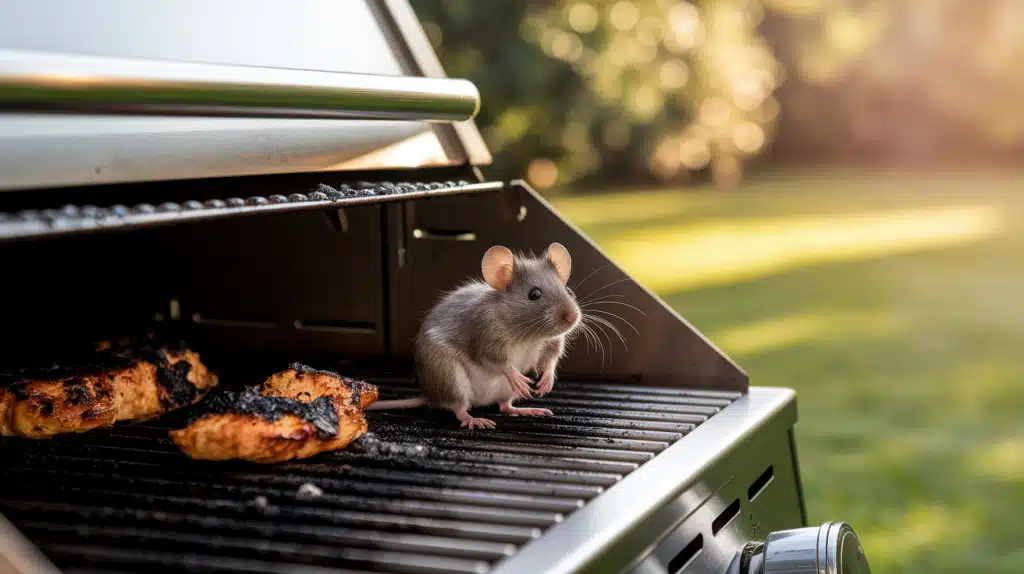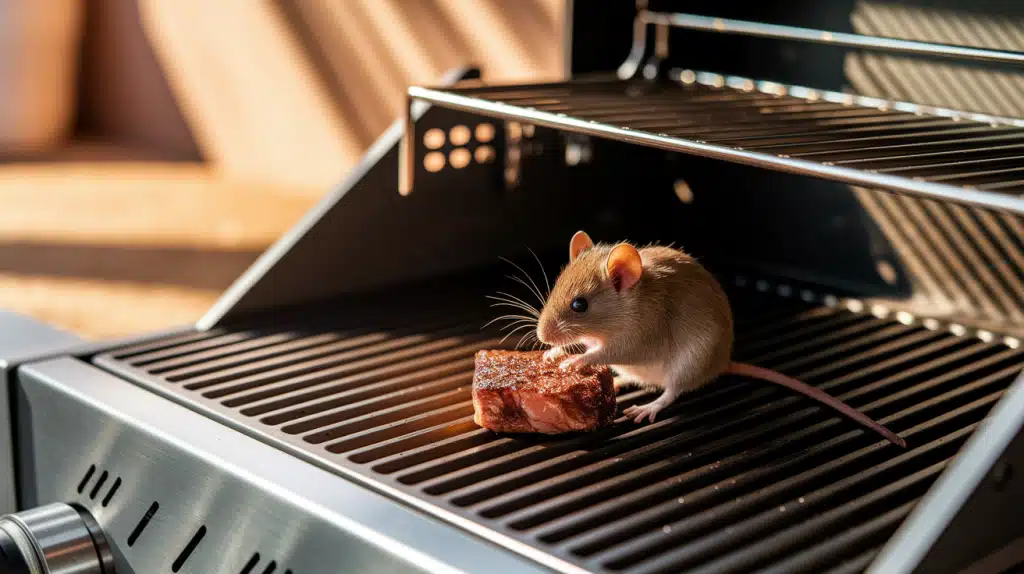You love firing up your grill for family cookouts and weekend BBQs, but finding mouse droppings on your cooking grates can ruin any meal.
Nobody wants to deal with contaminated surfaces, chewed wires, or the health risks that come with rodent infestations in their outdoor kitchen.
The good news is that keeping mice out of your grill doesn’t require expensive pest control services or toxic chemicals.
With the right prevention strategies and regular maintenance, you can protect your BBQ investment and keep your cooking area safe, clean, and in good condition.
This guide will show you precisely why mice target grills, how to spot the warning signs of infestation, and proven methods to mouse-proof your grill year-round.
Why Mice Are Attracted to Grills?
Mice see your grill as the perfect home for three main reasons. First, leftover food bits and grease create an all-you-can-eat buffet that draws them in.
Second, grills offer cozy warmth and shelter, making them ideal hideouts during cold months when mice need protection from harsh weather.
Finally, most grills have numerous entry points, such as vents, gaps, and openings, that make it easy for these small pests to slip inside unnoticed.
Understanding these attractions helps you take the right steps to make your BBQ less appealing to unwanted rodents.
Signs of Mice in Your Grill
- Droppings or urine smell: Look for small, dark pellets around your grill and sniff for a strong ammonia-like odor that signals mouse activity.
- Nesting materials: Check for shredded paper, leaves, fabric scraps, or other soft materials that mice gather to build their cozy homes inside your grill.
- Chewed insulation or wires: Inspect your grill for gnaw marks on plastic parts, frayed wires, or damaged insulation that shows mice have been busy.
- Strange noises or sightings: Listen for scratching, scurrying sounds from your grill, especially at night, or spot mice running near your BBQ area.
How to Keep Mice Out of Your Grill?
Keep mice out of your grill by eliminating food sources, sealing entry points, and using smart repellents to protect your BBQ from costly damage and contamination.
1. Clean Your Grill Thoroughly After Each Use
Remove all food scraps, grease, and cooking residue from grates and surfaces immediately after grilling.
Scrub drip pans and burner areas with hot, soapy water to eliminate any odors that attract mice. A clean grill removes the main reason mice want to visit your BBQ in the first place.
Pro Tip: Use a grill brush while the grates are still warm for easier cleaning.
2. Use a Tight-Fitting Grill Cover
Choose a heavy-duty vinyl or canvas cover that’s specifically designed to resist rodent damage. Ensure the cover fits tightly around all edges, with no loose areas where mice can squeeze through.
A proper cover acts as your first line of defense against unwanted visitors.
Best Practice: Check your cover monthly for tears or loose spots that need repair.
3. Seal Entry Points
Stuff stainless steel mesh or crumpled aluminum foil into air vents and openings during storage periods. Block gaps at the bottom of your grill with steel wool or hardware cloth that mice can’t chew through.
Sealing entry points forces mice to seek shelter and food elsewhere.
Safety Note: Remove all blocking materials before lighting your grill to ensure proper ventilation.
4. Store Grill Indoors or in an Elevated Position
Move your grill into a shed, garage, or covered patio whenever possible during off-seasons. If you must store the grill outside, place it on a platform or table to keep it off the ground.
Indoor or raised storage makes it much harder for ground-level rodents to access your grill.
Storage Tip: Disconnect propane tanks and store them separately in a well-ventilated area.
5. Use Natural or Commercial Repellents
Soak cotton balls in peppermint oil and place them safely inside your covered grill to deter mice. Try using dryer sheets or mothballs around (not inside) your grill area, but keep them out of reach of children and pets.
Natural repellents offer a chemical-free way to deter rodents from your grill area.
Replacement Schedule: Refresh peppermint oil cotton balls every 2-3 weeks for best results.
6. Install Motion-Activated Lights or Sound Devices
Set up battery-powered motion lights near your grill to startle mice during their nighttime activity. Consider ultrasonic devices that emit high-frequency sounds mice dislike but humans can’t hear.
These deterrents are most effective when mice are most active, during the dark hours.
Placement Guide: Position devices 6-8 feet from your grill for maximum coverage.
7. Empty and Remove Grease Trays Regularly
Clean out grease traps and drip pans after every cooking session to remove strong food odors. Wash these components with degreasing soap and store them indoors if possible.
Regular grease removal cuts off the main scent trail that leads mice to your grill.
Maintenance Reminder: Replace disposable drip pan liners after heavy grilling sessions.
8. Create a Rodent-Free Perimeter Around the Grill
Keep grass short and trim back bushes or plants within 3 feet of your grill area. Remove wood piles, cardboard boxes, and other clutter that provide hiding spots for mice.
A clean perimeter makes mice feel exposed and encourages them to nest somewhere else.
Yard Care Schedule: Maintain your grill area monthly during active grilling seasons.
What to Do If Mice Have Already Infested Your Grill
| Action | What to Do | Why |
|---|---|---|
| Wear gloves and a mask | Put on disposable gloves and a face mask | Protects from germs and rodent droppings |
| Remove nesting materials | Take out all debris, droppings, and nests using a trash bag | Prevents contamination and fire risk |
| Disinfect grill surfaces | Wipe all parts with a grill-safe disinfectant or diluted bleach | Kills bacteria and removes odor |
| Burn off the residue | Heat grill on high for 15–20 minutes before using again | Destroys germs and leftover traces |
Health Risks and Damages Caused by Mice in Grills
Mice in grills pose serious health risks through contamination and can cause costly damage by chewing wires, nesting, and leaving behind hazardous waste.
1. Rodent Droppings and Urine: Contamination
Mouse waste carries dangerous bacteria like Salmonella, E. coli, and hantavirus that can make you seriously ill. When droppings mix with food residue on your grill, they create a toxic contamination risk for your next meal.
Even small amounts of mouse urine can spread harmful germs across cooking surfaces and utensils. The strong ammonia smell from mouse waste also makes your outdoor cooking area unpleasant and unsafe.
2. Chewed Wires and Grill Components
Mice have teeth that grow constantly, so they gnaw on anything they can find, including electrical wires and gas lines. Damaged ignition wires can prevent your grill from starting or cause dangerous gas leaks that create fire hazards.
Chewed plastic parts, such as knobs, handles, and drip trays, often require expensive replacement to restore your grill’s function.
Structural damage to insulation and seals reduces your grill’s efficiency and can void the manufacturer’s warranty.
3. Nesting Material Buildup: Fire Hazard
Mice collect highly flammable materials, such as paper, fabric, and dried leaves, to build their nests inside grills. These materials can ignite instantly when you fire up your grill, causing dangerous flare-ups or house fires.
Blocked air vents from nesting debris prevent proper gas flow and ventilation, creating a risk of carbon monoxide exposure. Large nest buildups can damage internal components and require professional cleaning to remove safely.
Conclusion
Protecting your grill from mice isn’t just about avoiding unpleasant surprises; it’s about keeping your family safe and your BBQ investment in top condition.
By following the prevention strategies we’ve covered, from thorough cleaning after each use to sealing entry points during storage, you can enjoy worry-free grilling all season long.
Remember, the key to success is consistency. Make grill maintenance a regular habit by checking for signs of rodent activity monthly and addressing any issues promptly before they become major problems.
A few minutes of preventive work can save you hours of cleanup and potentially expensive repairs later.
What’s your biggest challenge with keeping pests away from your outdoor cooking area? Share your experiences or questions in the comments below – we’d love to help you find the perfect solution for your situation.
Frequently Asked Questions
What Can I Put in My Grill to Keep Mice Away?
Place peppermint oil-soaked cotton balls or dryer sheets inside your covered grill, but remove them before cooking to avoid chemical exposure.
Is It Safe to Use a Grill After Mice?
Yes, but first remove all droppings and nesting materials, disinfect all surfaces, then heat your grill to a high temperature for 15-20 minutes to kill germs.
How to Rodent-Proof a Grill?
Clean thoroughly after each use, seal vents with steel mesh during storage, use a tight-fitting cover, and store in an elevated or indoor location.
How Do I Keep Mice out of My Weber Gas Grill? ‘
Follow the same prevention steps – clean regularly, cover tightly, seal openings with steel wool, and consider storing your Weber in a garage or shed during off-seasons.




